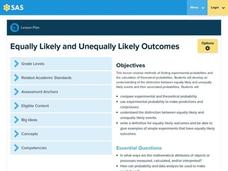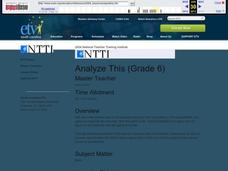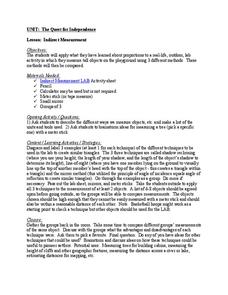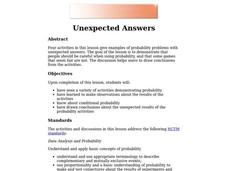Pennsylvania Department of Education
Equally Likely and Unequally Likely Outcomes
Students explore probability. In this statistics/probability lesson, students compare experimental and theoretical probability and use experimental probability to make predictions and conjectures. Students explore the distinction...
Curated OER
Introduction to Probability
In this probability worksheet, 11th graders review basic probability concepts such as chance, probability lines, and possible outcomes. There are 6 problems on here.
Curated OER
Analyze This
Sixth graders use a video and the internet to determine whether a game is fair or unfair. In this probabilities lesson plan, 6th graders determine the fairness of a game based on the probabilities of the outcomes.
Curated OER
Time-Axis Fallacy and Bayes Theorem
Students determine that knowledge of an event's outcome can affect the probability of the unknown outcome of an event that has already occurred.
Curated OER
Probability: the Study of Chance
Students experiment to determine if a game is fair, collect data, interpret data, display data, and state and apply the rule for probability. Students use a simple game for this experiment.
Curated OER
Indirect Measurement
Students measure and apply their knowledge of proportion to solve problems. In this geometry lesson, students measure using a meter stick, small mirror and measuring tape. They compare and contrast their measurements to objects outside...
Curated OER
Probability or Ability?
Students fill in a probability chart while attempting to catch candy with their non-dominant hands. They replicate the activity with a coin.
Curated OER
You May Already Be a Winner!
Second graders flip coins and tally the outcomes. They play the You May Already Be a Winner! game with cards under their chairs. Some cards are winners, some might be and the others are not. They play to explain the probability concept.
Curated OER
Chaos
Students experiment with several chaotic simulation, they build a working definition of chaos. Students reinforce their knowledge of basic probability and percents. They are reminded of previous knowledge that is pertinent to this...
Curated OER
Unexpected Answers
Students explore and complete a variety of activities demonstration probability. They make observations about the results of the activities. Students complete and discuss conditional probability. Also, students draw conclusions about...
Curated OER
Matching Pairs
Students examine the probability of the various findings in a game and determine the odds of winning. They differentiate between the facts of odds versus probability. Students use higher order thinking skills to explain how a problem is...
Curated OER
Compound Locus
Students investigate circles and compound locus. In this geometry instructional activity, students identify the distance from a point to a line. They use Cabri software to create lines and circles.
Curated OER
M & M Counting Chart
Students create an individual M&M's graph based on the number of each color of candy pieces in their handful of candy. They graph the favorite color of the whole class while practicing counting and color identification.
Curated OER
It Figures!
Students judge, compare and construct two-dimensional figures using a variety of materials.
Curated OER
II Similar
Pupils, through lecture and guided practice, discover the properties of similar triangles. They use given measurements of one triangle to find a missing measurement of a similar triangle. They apply this knowledge in real-life...
Other popular searches
- Combinations Tree Diagram
- Tree Diagram Worksheets
- Tree Diagrams Probability
- Probability and Tree Diagram
- Tree Diagram Probability
- Coin Toss Tree Diagram
- Math Tree Diagrams
- Cocoa Tree Diagram
- Tree Diagrams for Math
- Tree Diagram Activity Sheet
- Branching Tree Diagrams

















